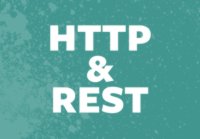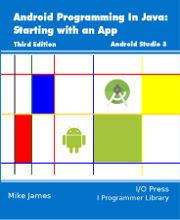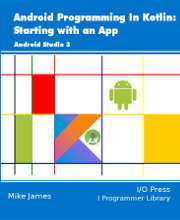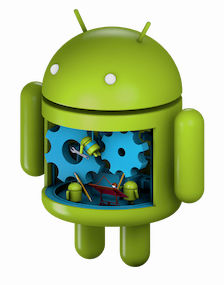| Android Development Resources For Free |
| Written by Limor Leah Wainstein | |||
| Friday, 30 March 2018 | |||
|
Android development relies on a range of technologies which you need to know something about before you embark on creating your own app. Here's an overview of free resources that can help you. Android is by far the most popular mobile operating system, with a 74.86 percent market share as of February 2018. Within the space of three years from 2014 to 2017, the number of available applications for download on the Google Play Store more than doubled from 1.3 million to 3 million. These figures show how the Android OS provides the perfect platform for developers to bring their ideas into fruition by creating apps for use on Android devices. With so many people using Android, it’s more likely that a well-made app will end up in the hands of many users. Java Programming from Derek Banas
Developing apps for use on Android platforms requires Java knowledge because it is the traditional primary Android development language. Derek Banas has an excellent 34-minute Youtube Java tutorial for developers who want to become familiar with core Java ideas and concepts without having to go through fundamental beginner concepts such as variable types.
Banas also provides a link to a Java Cheat Sheet 9on his New Think Tank website that complements what he goes through in the video tutorial. Within the code, there are helpful comments explaining everything, making this combined with the video a must-have resource for newcomers to Android development. Cloudinary: Android Image Upload Wiki PageCloudinary has a helpful page dedicated to Android image upload. This is an important concept to understand when developing Android apps because many apps need to incorporate the ability to upload images to a web server. For example, each time a user wants to set their own avatar or profile image, this requires coding image upload capability into the app. The Cloudinary Android image upload page discusses several methods for implementing this functionality, such as using libraries like Volley and Retrofit 2. XML Basics
For people just starting out with their first Android app, XML knowledge is imperative. XML is a markup language that you will use to describe things when building your Android app. The XML code will define how the user interface looks, including the placement of various elements within your app. The XML Basics resource on the XML News website is essential reading for any beginner Android developer. The language is not that difficult to get to grips with, and the XML basics resource provides a comprehensive one-page walkthrough on the structure of an XML document. A Beginner’s Guide to HTTP and REST
When you develop an Android application, there’s a good chance you’ll want to include the ability for that app to make calls to APIs provided by other web services. For example, some apps use API calls to Facebook, allowing users to upload their own photos from their Facebook profiles. To achieve API calls to web services like Facebook or Twitter when designing your Android app, you will need to understand a bit about HTTP and REST. HTTP provides the foundation for communicating data over the web, while REST gives you a simple way to organize interactions between your app and another independent system, like Facebook. This tutorial on Envato Tuts+ goes through the main ideas you need to grasp to understand HTTP and REST, including the syntax and some sample code.
How to Master Android
One of the best ways to improve your programming is to simply read through some examples of high-quality code implemented in various Android applications. Written by expert Android developer Aritra Roy, this useful resource collates 21 different Android applications, ranging in coding complexity from beginner to advanced. The apps are all open-source, and there are Google Play Store and Github links for each different app, meaning you can first download the apps to get a feel for how they work before delving into the code. The resource contains tidbits of information in each app description, highlighting various aspects of the apps you should pay attention to for improving your Android development knowledge. Also see I Programmer's coverage of Android Programming, in particular our articles introducing beginners to Android Studio, the Android IDE. The latest versions of these articles are now available in book form covering Java and Kotlin separately:
Wrap Up
In addition to brushing up your Android development knowledge with these resources, make sure you also follow some established best practices for Android programming. Some examples of best practices include:
Also bear in mind the main challenges of Android app development, which typically relate to a lack of hardware standardization, and, of course, the potential for security issues to arise. Awareness of these challenges before coding will lead to better applications.
Related Articles Android Studio 3.1 Released - Widgets Lost Kotlin - New Language For Android
To be informed about new articles on I Programmer, sign up for our weekly newsletter, subscribe to the RSS feed and follow us on Twitter, Facebook or Linkedin.
Comments
or email your comment to: comments@i-programmer.info
|
|||
| Last Updated ( Friday, 30 March 2018 ) |










